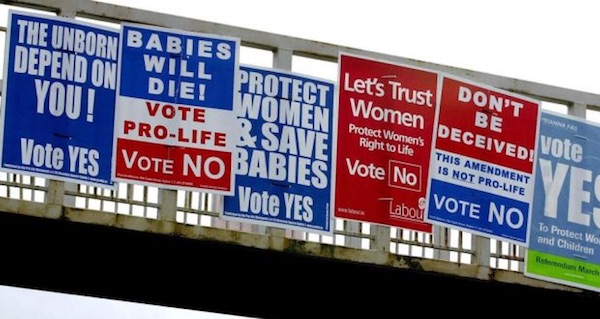
The Dublin government has paved the way for a referendum on abortion next May which has already provoked unanswered questions as to what is actually being proposed.
Taoiseach Leo Varadkar has said he supports making abortion freely available for the first three months of pregnancy, and said he trusts the Irish people to make the right decision “based on compassion”. However, with Varadkar’s cabinet badly split on the issue, no decision has yet been made on what options are to be put to the people.
Opposition to abortion and euthanasia is much stronger in Ireland than in other counties as there is a widespread conviction that life begins at conception and continues after death. Polls have always indicated little support for abortion on demand and in 1983, voters backed by two-to-one a constitutional Amendment, the Eighth, which recognised equally the right to life of a mother and her unborn child.
This week, cabinet ministers voted unanimously to hold a referendum asking voters if they want to repeal that Amendment. However, they are deeply divided on a new formalism for Irish policy on abortion, and have been unable to make a decision on what the new policy should look like.
Mr Varadkar told reporters on Monday night that the constitution is not the place to deal with an issue that is “not black and white”, but that he is in favour of recommendations allowing abortion up to 3 months. It would be a dramatic change which could bring abortion clinics to Ireland for the first time.
Varadkar warned that “women from every county are risking their lives” by obtaining abortion tablets through the post, adding we can’t continue to “criminalise our sisters and friends”.
He claimed that if the referendum is passed, abortion would be “safe, legal and rare”.
His deputy, Tanaiste Simon Coveney, immediately disputed this and said he would not be supporting it. He said he would onlysupport terminations in cases of rape, incest and fatal foetal abnormalities and when a woman’s life or health was at risk.
“The State has a responsibility towards an unborn child and that goes for pre-12 weeks and post 12-weeks. There is a minimum level of protection that the State should be providing in law,” he said.
The 26 County state has held five abortion referendums since the the Eighth Amendment was passed to challenge the statement that the unborn child had “an equal right to life”. In practice this was interpreted by some doctors as a blanket ban on abortion, leading to the procedure being refused to women who were suicidal, who became pregnant through rape or incest, or who had fatal foetal abnormalities.
Referendums in 1992 and 2002 failed to alter this position, although measures to allow the right to travel for an abortion and for information to assist the process passed in 1992.
However, Ireland’s stance on abortion became notorious again in 2012 when Savita Halappanavar, a 31-year-old dentist originally from India, died in hospital in Galway due to the complications of a septic miscarriage. Her death could have been prevented by an abortion, which was refused to her.
In response to the outcry over her death, the public will this year be asked on the ballot paper whether they wish to repeal the Eighth Amendment and replace it with an enabling provision giving elected politicians the responsibility to come up with legislation.
The Taoiseach said it’s “high time” people were asked to vote on this question when “nobody under 52 has had a say on the matter”. He pointed to the fact that Irish abortions have taken place without restriction in Britain, but said his government “are no longer willing to export our problems.”
Varadkar’s stance in favour of abortion in the first trimester of pregnancy won a surprise ally in Fianna Fail leader Micheal Martin. His party colleagues are broadly opposed to the measure, but have been allowed to vote according to their conscience.
At last year’s annual party conference, the Sinn Fein leadership required its elected members to vote for the repeal of the Eighth Amendment, but has not yet said what alternative abortion policy they should endorse.
However, Sinn Fein’s spokeswoman on the issue, Louise O’Reilly, welcomed the announcement of a referendum. “The eighth amendment must go and Sinn Fein is ready for this repeal campaign,” she said. “Compassion and trust in women must prevail.”
![[Irish Republican News]](https://republican-news.org/graphics/title_gifs/rn.gif)
![[Irish Republican News]](https://republican-news.org/graphics/title_gifs/harp.gif)

